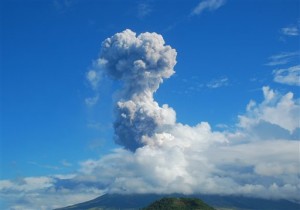NDCC: 4 fatalities in Mayon steam explosion were foreigners
MANILA, Philippines – Four of five climbers who died in the slope of Mayon Volcano when it spewed steam and ash Tuesday morning were foreigners, the National Disaster Risk Reduction and Management Council said.

In this photo taken from Legazpi, the capital city of Albay province in the central Philippines, a cloud of ash shoots up to the sky as Mayon volcano erupts about 450 kilometers (285 miles) southeast of Manila Tuesday morning, May 7, 2013. A mountain guide said three foreign climbers and their Filipino guide were killed when the volcano, one of the Philippines’ most active volcanoes, spewed rocks and ash after a 3-year calm. AP
The only Filipino fatality was identified as Jerome Berin, the tour guide, while the four foreigners have not yet been named.
The injured were Bernard Hernandez, Calixto Balunso, Nicanor Mabao and an unnamed Thai national.
The Philippine Air Force deployed two of its choppers to help in rescue operations.
Raffy Alejandro of Office of Civil Defense in Bicol said the five were a half kilometer from the crater when Mayon Volcano spewed ash.
“Apparently kasi may ravine dyan, kasi mga hardened lava na yan ano, so parang mga ravine na yan, according dun sa guard na nakakita nung explosion, may konting tremor at nahulog yung lima. Nakita n’yang nahulog. At malalim kasi, mga 1,000 feet yung lalim ng ravine,” he said.
Article continues after this advertisementThe “small phreatic explosion” of Mayon Volcano occurred past 8 a.m. Tuesday, which lasted 2 minutes 26 seconds.
Article continues after this advertisementThe explosion column produced was 500 meters high above the summit and precipitated traces of ash in the areas west-northwest of the volcano, affecting Barangays (villages) Muladbucad, Guinobatan and Nabonton, Nasisi, Basag and Tambo, Ligao City, Albay, and areas upslope of these barangays, the Philippine Institute of Volcanology and Seismology said.
Only one minor rockfall event was detected by the Mayon seismic network in the past eight hours. Phivolcs said at 4 p.m. seismic parameters remained within background levels and indicated no increase in overall volcanic activity.
Alert Level 0 was still over Mayon Volcano, which means that no magmatic eruption is imminent. However, small phreatic explosions including small steam and ash explosions may occur suddenly with little or no warning, Phivolcs said.
Phivolcs strongly advised the public to remain within six-kilometer radius permanent danger zone (PDZ) due to the perennial threat of sudden steam-driven eruptions and rockfalls from the upper and middle slopes of the volcano.